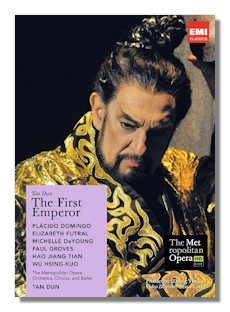
The Internet's Premier Classical Music Source
Related Links
- Tan Dun Reviews
- Latest Reviews
- More Reviews
-
By Composer
-
Collections
DVD & Blu-ray
Books
Concert Reviews
Articles/Interviews
Software
Audio
Search Amazon
Recommended Links
Site News
 DVD Review
DVD Review
Tan Dun

The First Emperor
- Plácido Domingo (Emperor Qin)
- Elizabeth Futral (Princess Yueyang)
- Paul Groves (Gao Jianli)
- Wu Hsing-Kuo (Yin-Yang Master)
- Michelle DeYoung (Shaman)
- Haijing Fu (Chief Minister)
- Hao Jiang Tan (General Wang)
- Susanne Mentzer (Mother of Yueyang)
- Dou Dou Huang (Principal dancer)
- Qi Yao (Zheng player)
Metropolitan Opera Orchestra, Chorus & Ballet/Tan Dun
EMI Classics 215129-9 2DVDs 2:57
In the 1990s, when composer Tan Dun first visited the Met, he heard Plácido Domingo sing Calaf in Turandot. At that time, he was so impressed that he vowed that he would write an opera for Domingo to perform there. For him, then, The First Emperor is a dream come true. Based on Chinese history from more than two millennia ago, and a screenplay, The First Emperor "is an epic story of love, power, and betrayal" – typically operatic fare, in other words.
The Emperor Qin seeks to unite neighboring states again the "barbarians," although his efforts involve warfare, not politics. As the empire grows bigger it grows more diverse, and there is more discontentment as states are conquered and slaves are forced to build the Great Wall. Qin wants Gao Jianli, a boyhood friend, to compose an anthem appropriate for the new empire. As Gao Jianli's homeland is one of the territories conquered by Qin, he has reservations. Qin's beautiful, crippled daughter, the Princess Yueyang, falls in love with Gao Jianli, and induces him to stay. After Yueyang and Gao Jianli consummate their forbidden passion, she discovers she can walk again. Qin is torn between feelings of gratitude and betrayal, because Yueyang was promised to Wang, his military general. Gao Jianli eventually completes the anthem, but Emperor Qin realizes, in the opera's last moments, that it is not that anthem that he wanted, because it is based on the song of the slaves who were building the Great Wall.
The opera was premièred at the Met on December 21, 2006; this performance took place on January 13, 2007, and was simulcast live in movie theaters all over the United States, using the High Definition format. The DVDs look and sound handsome; I bet what theater audiences saw and heard across the country was impressive indeed.
Unfortunately, The First Emperor is not a successful opera. It is interesting but seldom exciting – it doesn't grab one by the lapels like the aforementioned Turandot. Not that Tan Dun should imitate Puccini, of course, except in the Italian composer's practical understanding of what is and isn't dramatically compelling. The First Emperor is in two acts, each about 75 minutes long, but it feels longer, because it never builds up any dramatic momentum. Worse, the characters never seem real, and as a result, it is difficult to care about them.
It's not for lack of trying, though. (Perhaps everyone tried too hard.) The Last Emperor was directed by excellent Chinese film director Zhang Yimou (Raise the Red Lantern, etc.) and features many estimable talents from Western opera and Peking Opera. Every practical attempt was made to introduce cultural authenticity into The Last Emperor – no idle chinoiserie here. Tan Dun labored hard to make West and East come together – "1 + 1 = 1," as he puts it. Visually, it is a spectacle, and the first ten percussion-driven minutes of the score make one believe that something magical is going to happen. Ironically, those ten minutes of music are rejected by Emperor Qin, the moment he walks on stage! If Tan Dun had been able to sustain the opening's momentum, The Last Emperor would have been a much better opera.
Domingo works hard in the title role, but he looks and sounds like a fish out of water, and frankly, I think his talents were wasted here. As Princess Yueyang, Elizabeth Futral sounds young and fresh in what is essentially a lyric-coloratura role – shades (unfortunately) of Yum-Yum in The Mikado! Paul Groves sings very nicely as Gao Jianli, yet he cannot make a real person out of his role either. The remaining roles are pretty unrewarding, with the exception of the Shaman (who Michelle DeYoung seems to enjoy) and the Yin-Yang Master. This latter role is given to Chinese performer Wu Hsing-Kuo, and one cannot takes one's eyes and ears off of him. Domingo might be this production's centerpiece, but it is Wu Hsing-Kuo who is its star.
As a bonus, there is a 21-minute documentary of The First Emperor in rehearsal. It is fun to see Domingo gamely trying to turn himself into a Chinese emperor, but really, what did he have to lose by being involved with this production? There's also a tiny little segment of Domingo with Beverly Sills. It's melancholy to watch, though, because she would be dead in less than six months, and if anything, Domingo should have been praising her, not the other way around!
It's sad when many talented people from different nations labor valiantly together and produce something that is visually stunning, but that falls so flat as music and drama. Tan Dun is a talented composer – his Water Passion After Saint Matthew was one of my favorites CDs of 2002 – and perhaps he will take another look at The First Emperor and see what can be done to make it more viable.
Copyright © 2009, Raymond Tuttle




















